May 27, 2015
MIDDLE EAST
-
5 hours ago in News Bulletins
-
11 hours ago in News Bulletins
-
3 hours ago in News Bulletins
-
4 hours ago in News Bulletins
-
4 hours ago in Africa
-
4 hours ago in Features
-
4 hours ago in Asia
-
4 hours ago in Analysis
-
4 hours ago in Middle East
-
4 hours ago in Middle East
-
5 hours ago in News Bulletins
ISIS militants ‘advance towards Damascus’

Al-Rahman corps and the Islamic Union for Recruiting the Levant take part in a military training in Marj Al-Ashari, eastern Ghouta of Damascus. (Reuters)
By Staff writer | Al Arabiya News
Tuesday, 26 May 2015
Tuesday, 26 May 2015
Syrian regime strikes against ISIS in and around the ancient city of Palmyra have failed to halt their advance towards Damascus, a monitor said on Sunday.
The intense strikes came after the fall of Palmyra, named Tadmor in Arabic, to the militants last week. But so far, the strikes had failed to halt the militants, who advanced towards the capital Damascus and overran major phosphate mines about 70 kilometers south of Palmyra.
“ISIS has made further progress on the Tadmor-Damascus highway and grabbed the Khnaifess phosphate mines and nearby houses,” said the Syrian Observatory for Human Rights, which relies on a network of sources on the group for its reports.
“It has extended its control over larger areas and even greater economic interests,” added the monitor.
A Syrian military source on Sunday told Agence France-Presse that the air force struck more than 160 ISIS targets.
“We are pursuing Daesh wherever they are,” the source said, using the Arabic acronym for ISIS.
“The air force struck more than 160 Daesh targets, killing and wounding terrorists and destroying weapons and vehicles equipped with machine guns” on Palmyra’s outskirts and elsewhere in the east of Homs province, the source said.
“Military operations, including air raids, are ongoing in the area around Al-Suknah, Palmyra, the Arak and Al-Hail gas fields and all the roads leading to Palmyra,” he said.
State television said “more than 50 Daesh terrorists” had been killed in the air strikes.
The Syrian Observatory for Human Rights said at least four civilians had been killed in the raids, which were the most intense since the militants overran the city on Thursday.
The strikes targeted several areas of the city, including some close to the city’s famed Graeco-Roman ruins, a UNESCO world heritage site, Observatory director Rami Abdul Rahman told AFP.
Dozens of people had also been wounded in the raids, and ISIS was believed to have taken losses when a military security building was hit, Rahman said.
ISIS is accused of executing hundreds of people in and around Palmyra since it swept into the oasis city last week after a lightning advance across the desert from its stronghold in the Euphrates Valley to the east.
(With AFP)
Last Update: Tuesday, 26 May 2015 KSA 12:13 - GMT 09:13
RELATED STORIES
 Biden does damage control over Iraq remarks
Biden does damage control over Iraq remarks IT chief at Bangladesh Coca-Cola unit arrested as ISIS suspect
IT chief at Bangladesh Coca-Cola unit arrested as ISIS suspectISIS faces battle in Iraq, bombs in Syria
 Five ex-pupils of London school killed fighting for ISIS
Five ex-pupils of London school killed fighting for ISIS Iran's Qassem Soleimani: U.S. has 'no will' to fight ISIS
Iran's Qassem Soleimani: U.S. has 'no will' to fight ISIS Iraq plans to retake Ramadi from ISIS ‘in days’
Iraq plans to retake Ramadi from ISIS ‘in days’ GCC denies air campaign against ISIS has failed
GCC denies air campaign against ISIS has failed ISIS executes 16 traders on Iraqi road
ISIS executes 16 traders on Iraqi road
SHOW COMMENTS
Yemen man pleads guilty to al-Qaeda scheme to kill U.S. military

A courtroom sketch shows Saddiq al-Abbadi (R) as he pleads guilty during a hearing in Brooklyn federal court in New York May 26, 2015. (Reuters)
By Nate Raymond | Reuters, New York
Wednesday, 27 May 2015
Wednesday, 27 May 2015
A Yemeni man who prosecutors said was a member of al-Qaeda and engaged in attacks against U.S. military forces stationed in Iraq and Afghanistan pleaded guilty on Tuesday to conspiring to kill Americans overseas.
Saddiq al-Abbadi, 40, pleaded guilty in federal court in Brooklyn, New York, to four counts including conspiracy to murder U.S. nationals abroad and conspiracy to provide material support to a foreign terrorist organization.
The plea came after prosecutors in January unveiled charges against al-Abbadi and another Yemeni man, Ali Alvi al-Hamidi. Both men had been arrested in Saudi Arabia and subsequently expelled.
Al-Abbadi faces up to life in prison. U.S. District Judge Nicholas Garaufis scheduled sentencing for September 25.
Prosecutors have said that al-Abbadi fought against U.S. military forces in Iraq between 2003 and 2007, before traveling with Al-Hamidi to Pakistan in 2008 to train and fight with al-Qaeda.
In mid-2008, al-Abbadi and al-Hamidi traveled from Pakistan to separate parts of Afghanistan to conduct attacks against the U.S. military, prosecutors said.
Al-Abbadi led at least two separate attacks against U.S. forces in Pakistan’s Paktya province, including one in May 2008 in which a U.S. Army Ranger died and several others were wounded, prosecutors said.
The pair also helped Bryant Neal Vinas, a Long Island man, join the Islamic militant group, prosecutors said in court documents. Vinas pleaded guilty in 2009 to helping al Qaeda plan an attack on the Long Island Rail Road.
Al-Abbadi had been a longtime member of al Qaeda, prosecutors said, and engaged directly with its senior leadership, including Abu Saeed al-Masri, its former third-ranking member who was killed in 2008.
Al-Abbadi was previously convicted in Saudi Arabia for plotting an al Qaeda attack there, and served 5-1/2 years of a 12-year prison sentence, according to court records.
Charges remain pending against al-Hamidi, 30, who pleaded not guilty in February to five counts including conspiracy to murder U.S. nationals abroad and providing and attempting to provide of material support to a foreign terrorist organization.
Last Update: Wednesday, 27 May 2015 KSA 00:42 - GMT 21:42
SHOW COMMENTS
Iran nuclear deal unlikely by June 30: French envoy
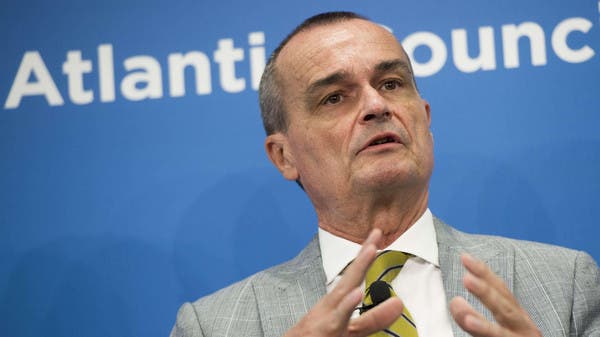
French Ambassador to the US, Gerard Araud speaks about the Iranian nuclear negotiations at the Atlantic Council in Washington, DC, May 26, 2015. (AFP)
By Arshad Mohammed | Reuters, Washington
Wednesday, 27 May 2015
Wednesday, 27 May 2015
An Iran nuclear deal is not likely by June 30 because technical details will remain to defined and Iran will not get sanctions relief before the end of the year in the best of cases, western ambassadors said on Tuesday.
Six major powers are seeking to negotiate an agreement under which Iran would limit its nuclear program in exchange for the easing of economic sanctions that have crippled its economy.
Envoys from Britain, France and Germany, three of the so-called P5+1 group that includes China, Russia and the United States, sketched out their expectations for the end game as a self-imposed June 30 approaches.
"It's very likely that we won't have an agreement before the end of June or even (right) after," French ambassador to the United States Gerard Araud said in an appearance at the Atlantic Council think tank with his British and German counterparts.
The Iranians want to force the six powers' ministers to decide the issues, rather than lower-level officials, Araud said, saying he expected some melodrama toward the end with late nights and doors slammed as both sides jockey for the best deal.
"Even if we get the best deal ... afterwards, you will have to translate it into the technical annexes, so it may be ... we could have a sort of fuzzy end to the negotiation," he said.
Speaking after the event, Araud said it could take a few weeks of July to complete the technical annexes that are envisaged under an agreement if one can be reached.
Iran and the six powers reached a framework agreement on April 2, but several issues remain unresolved, including the pace of sanctions relief and the monitoring and verification measures to ensure Iran does not pursue a clandestine nuclear program.
Iranian officials have said they must receive sanctions relief immediately upon reaching an agreement. Western officials have argued that sanctions will be eased gradually and only after Iran has taken steps to limit its nuclear program.
"Iran needs some time to start the implementation of this agreement, so in the best case sanctions relief would not happen before the end of this year," German ambassador to the United States Peter Wittig said.
Last Update: Wednesday, 27 May 2015 KSA 00:48 - GMT 21:48
RELATED STORIES
 Nuclear Iran 1,000 times worse than ISIS: Netanyahu
Nuclear Iran 1,000 times worse than ISIS: Netanyahu Obama signs bill giving Congress a say on Iran nuclear deal
Obama signs bill giving Congress a say on Iran nuclear deal Iran denies agreement on military site inspections
Iran denies agreement on military site inspections Iran hopes to return oil exports to pre-sanctions level
Iran hopes to return oil exports to pre-sanctions level Netanyahu says not too late to stop Iran nuclear deal
Netanyahu says not too late to stop Iran nuclear dealKerry: Iran nuclear deal could be lesson for North Korea
SHOW COMMENTS
Ban Ki-moon orders Yemen peace talks delay
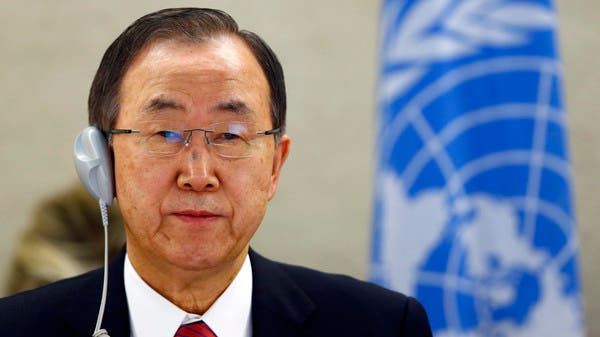
Secretary-General Ban Ki-moon ordered the postponement, spokesman Stephane Dujarric said, adding that Ban “is actively working to convene the talks at the earliest possible time.” (File Photo: Reuters)
Associated Press, United Nations
Tuesday, 26 May 2015
Tuesday, 26 May 2015
A conference aimed at restoring peace to conflict-torn Yemen has been postponed following a request from Yemen’s government and other parties for more time to prepare, the U.N. announced Tuesday.
The peace talks had been scheduled to start Thursday in Geneva. Several Yemeni officials said over the weekend they had been informed that the talks were postponed, but the U.N. statement was the first official confirmation.
Secretary-General Ban Ki-moon ordered the postponement, spokesman Stephane Dujarric said, adding that Ban “is actively working to convene the talks at the earliest possible time.”
The talks were meant to end weeks of heavy fighting and Saudi-led airstrikes against an Iran-backed Shiite militia group known as the Houthis amid a humanitarian crisis that has left millions in the Arab world’s poorest country short of food and fuel.
Dujarric said Ban is disappointed that the U.N.-sponsored talks weren’t starting on schedule and again called on all parties to participate “in good faith.”
Despite the U.N. appeal for all parties to attend the talks without preconditions, the exiled government of President Abedrabbu Mansour Hadi had reiterated its demand that Houthi militia first pull out of cities and towns seized in recent months, including the capital, Sanaa.
The Houthis backed the talks and said they would participate. Houthi militia leader Abdul-Malek al-Houthi had described talks as the only solution to the war, a view backed by the U.N. chief. Al-Houthi boycotted a recent conference hosted by Saudi Arabia, demanding that peace negotiations be held in a neutral country.
The talks, announced last week, were the first major initiative of the new U.N. special envoy for Yemen, Ismail Ould Cheikh Ahmed, who this month held meetings in Yemen with rival political players.
Ban asked Ahmed to redouble his efforts with all parties and countries in the region “with the aim of producing a comprehensive ceasefire and the resumption of peaceful dialogue and an orderly political transition,” Dujarric said.
Ban noted the escalation in fighting following a five-day humanitarian pause that ended last week and urged all parties “to be mindful of the suffering of Yemeni civilians” caused by a delay in returning to peace talks, the spokesman said.
Last Update: Tuesday, 26 May 2015 KSA 22:59 - GMT 19:59
SHOW COMMENTS
Gaza rocket hits southern Israel: Army
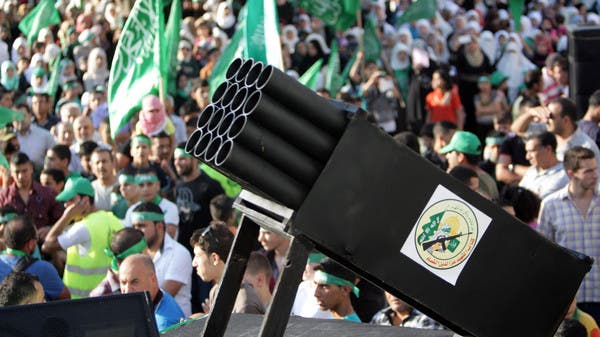
Palestinians show a rocket launcher during a celebration organized by Hamas in the West Bank city of Nablus, on Friday, Aug. 29, 2014. (File photo: AP)
AFP, Jerusalem
Tuesday, 26 May 2015
Tuesday, 26 May 2015
A rocket fired by militants in the Palestinian Gaza Strip hit southern Israel on Tuesday, the army said, but there were no immediate reports of casualties or damage.
"Rockets were launched from the Gaza Strip at southern Israel. One hit near the community of Gan-Yavne," an army statement said of a community east of the port city of Ashdod.
"No injuries were reported."
Police said they had not yet located the point of impact.
Eyewitnesses in Gaza told AFP they had seen one rocket being fired from the Palestinian enclave at Israel.
Last month a rocket fired from Gaza hit Israel, prompting the army to retaliate with tank fire. Nobody was hurt.
Israel went to war against the Islamist Hamas, the de facto power in Gaza, last summer with the aim of stamping out cross-border rocket and mortar attacks.
The 50-day conflict killed about 2,200 Palestinians, most of them civilians, and 73 on the Israeli side, most of them soldiers.
It caused heavy damage to Gaza's infrastructure and damaged more than 160,000 homes.
"Rockets were launched from the Gaza Strip at southern Israel. One hit near the community of Gan-Yavne," an army statement said of a community east of the port city of Ashdod.
"No injuries were reported."
Police said they had not yet located the point of impact.
Eyewitnesses in Gaza told AFP they had seen one rocket being fired from the Palestinian enclave at Israel.
Last month a rocket fired from Gaza hit Israel, prompting the army to retaliate with tank fire. Nobody was hurt.
Israel went to war against the Islamist Hamas, the de facto power in Gaza, last summer with the aim of stamping out cross-border rocket and mortar attacks.
The 50-day conflict killed about 2,200 Palestinians, most of them civilians, and 73 on the Israeli side, most of them soldiers.
It caused heavy damage to Gaza's infrastructure and damaged more than 160,000 homes.
Last Update: Tuesday, 26 May 2015 KSA 22:27 - GMT 19:27
SHOW COMMENTS
Nuclear Iran 1,000 times worse than ISIS: Netanyahu
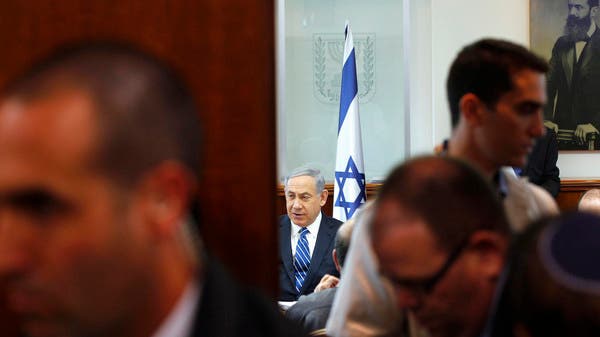
Israel's Prime Minister Benjamin Netanyahu, center, attends a cabinet meeting at his office in Jerusalem Tuesday, May 26, 2015. (AP)
AFP, Jerusalem
Tuesday, 26 May 2015
Tuesday, 26 May 2015
Israeli Prime Minister Benjamin Netanyahu warned on Tuesday that a nuclear-armed Iran would be “a thousand times more dangerous and more destructive” than the Islamic State of Iraq and Syria (ISIS) group, his office said.
“As horrific as ISIS is, once Iran, the preeminent terrorist state of our time, acquires nuclear weapons, it will be a hundred times more dangerous, a thousand times more dangerous and more destructive than ISIS,” Netanyahu said, referring to ISIS.
His remarks came as political and technical experts representing Iran and world powers were to convene in Vienna ahead of a June 30 deadline for a deal over Tehran’s nuclear program.
“As we are meeting, the P5+1 talks are reconvening, and I’m afraid they’re rushing to what I consider is a very bad deal,” Netanyahu told U.S. Senator Bill Cassidy, in remarks relayed by the Israeli premier’s office.
“I see no reason to rush to a deal and certainly not a bad deal that paves Iran’s path to the bomb, but also fills Iran’s coffers with tens of billions of dollars to pursue its aggression throughout the Middle East and around Israel’s borders,” he said.
Netanyahu has been a fierce critic of the looming deal between Iran and world powers comprising the United States, Britain, China, France, Russia and Germany.
The accord would finalize an April 2 deal preventing Tehran from developing nuclear weapons in exchange for an easing of crippling economic sanctions.
“We shouldn’t give Iran a path to nuclear weapons and billions of dollars to pursue aggression because of ISIS,” Netanyahu said of the group, which both the U.S. and Iran see as a threat.
“ISIS should be fought; Iran should be stopped.”
Last Update: Tuesday, 26 May 2015 KSA 22:32 - GMT 19:32
RELATED STORIES
 Israel’s Olmert sentenced to eight months in prison
Israel’s Olmert sentenced to eight months in prison Who is the biggest threat in the Mideast: Iran or Israel?
Who is the biggest threat in the Mideast: Iran or Israel? Israel thanks U.S. for opposing nuke-free Mideast plan
Israel thanks U.S. for opposing nuke-free Mideast plan Pizzeria in Israel ‘sprinkles marijuana instead of oregano’
Pizzeria in Israel ‘sprinkles marijuana instead of oregano’U.S. rejects nuclear disarmament document over Israel concerns
 Dispute erupts over Mideast nuclear arms ban
Dispute erupts over Mideast nuclear arms ban Obama tells Israelis: America has your back
SHOW COMMENTS
Egypt protests Pakistan criticism of Mursi death sentence
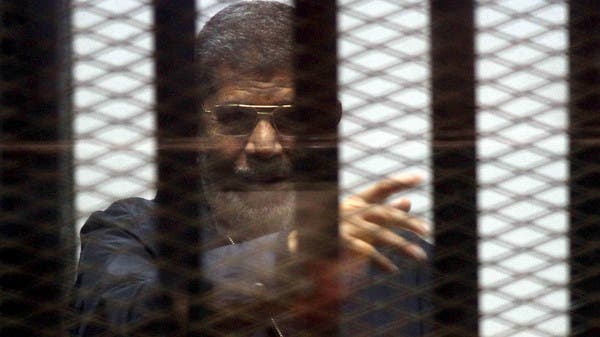
Ousted Egyptian President Mohamed Mursi is seen behind bars during his trial at a court in Cairo, April 30, 2015. (Reuters)
AFP, Cairo
Tuesday, 26 May 2015
Tuesday, 26 May 2015
Egypt summoned Pakistan’s charge d’affaires to protest at Islamabad’s criticism of the death sentence handed down to ousted Islamist president Mohamed Mursi, the foreign ministry said on Tuesday.
Egypt denounces any “interference in its internal affairs which casts a shadow on relations between the two countries,” the ministry said in a statement a day after summoning Mohamed Eijaz.
Mursi, Egypt’s first freely elected president, and more than 100 other defendants were sentenced to death by a court on May 16 for their role in a mass prison break during the 2011 uprising.
The sentence was criticized by human rights groups, the United States and the European Union, as well as Pakistan.
“The dispensation of justice must be based on the principles of equity and fairness,” Pakistan’s foreign ministry said in a statement issued on May 19.
“This is all the more important when political prisoners especially a former elected president, who was ousted from office, is brought before the court of law.”
Mursi was ousted by then-army chief and now President Abdel Fattah al-Sisi in July 2013 after mass street protests against his one-year rule.
A government crackdown overseen by Sisi has left hundreds of Mursi supporters dead, thousands imprisoned and dozens sentenced to death after speedy trials, described by the United Nations as “unprecedented in recent history”.
Mursi has also been sentenced to 20 years in jail in a separate trial.
Last Update: Tuesday, 26 May 2015 KSA 19:59 - GMT 16:59
SHOW COMMENTS
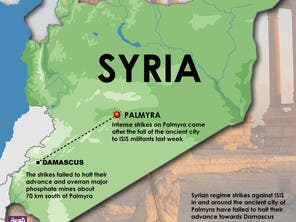



















No comments:
Post a Comment
Please leave a comment-- or suggestions, particularly of topics and places you'd like to see covered